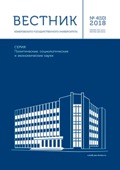Belgorod, Belgorod, Russian Federation
Moskva, Russian Federation
The research features the main factors that influence the effectiveness of team work, i.e. the size of the team, the age and sex its members, their psychological compatibility, cohesion, and relationship character. The paper proves the ambiguous nature of the influence of these factors on team work effectiveness and states the need for a situational approach. The authors believe that the size of the team and its cohesion produces a positive effect on the team work and establish various types of effects, e.g. the effect of social laziness, the effect of freedom from obligations, the effect of conformism, the effect of one-sidedness, the halo effect, etc. According to the authors, the cooperation and rivalry are the main styles of relations in team work. The propositions expressed by the authors expand the field of scientific discussion on the problem of the effectiveness of team work.
collective activity, psychological compatibility, cohesion, group effects, conformism, cooperation, rivalry, egoistic altruism
1. Rozanova V. A. Psikhologiia upravleniia [Psychology of management]. Moscow: Biznes-shkola «Intel-Sintez», 1999, 352.
2. Zazhogina N. V. Psikhologicheskie osobennosti priniatiia resheniia v protsesse gruppovogo vzaimodeistviia [Psychological features of decision-making in the process of group interaction]. Pedagogika i psikhologiia obrazovaniia = Pedagogy and psychology of education, no. 4 (2010): 93-101.
3. Ulyanova N. Yu. Vzaimosviazʹ sotsialʹno-psikhologicheskoi i predmetno-deiatelʹnostnoi effektivnosti i splochennosti proizvodstvennykh grupp [Interrelation of the socio-psychological and subject-activity efficiency and cohesion of production groups] Severo-Kavkazskii psikhologicheskii vestnik = North Caucasian Psychological Herald, 10, no. 3 (2012): 28-31.
4. Rozenberg N. V., Ushkina I. A. Konformizm kak sotsialʹnyi fenomen [Conformism as a social phenomenon]. Izvestiia vysshikh uchebnykh zavedenii. Povolzhskii region. Obshchestvennye nauki = News of Higher Educational Institutions. The Volga region. Social Sciences, no. 3 (2014): 142-150.
5. Deutch M. The effects of cooperation and competition upon group process. Group dynamics. Eds. Cartwright D., Zander A. Evanston, 1960, 24-37.
6. Druker P. F. Rynok: Kak vyiti v lidery. Praktika i printsipy [Market: How to become a leader. Practice and principles]. Moscow: Buk Chember Interneshnl, 1992, 350.
7. Povarich I. P., Slinkova O. K. Metodika i opyt sotsiologicheskogo issledovaniia udovletvorennosti trudom rabotnikov predpriiatii [Methodology and experience of sociological research of job satisfaction of enterprise employees]. Polzunovskii vestnik = Polzunovsky vestnik, no. 3-1 (2006): 221-224.
8. Stephens C. Modeling Reciprocal Altruism. British Journal for the Philosophy of Science, 47, no. 4 (1996): 533-551.
9. Trivers R. L. The evolution of reciprocal altruism. Quarterly Review of Biology, no. 46 (1971): 35-57.
10. Slinkova O. K. Trudovaia motivatsiia i organizatsionnaia kulʹtura: teoretiko-metodologicheskie i prikladnye osnovy issledovaniia. Diss. doktora ekon. nauk [Labor motivation and organizational culture: theoretical, methodological and applied research bases. Dr. Econ. Sci. Diss.]. Kemerovo, 2006, 331.




















